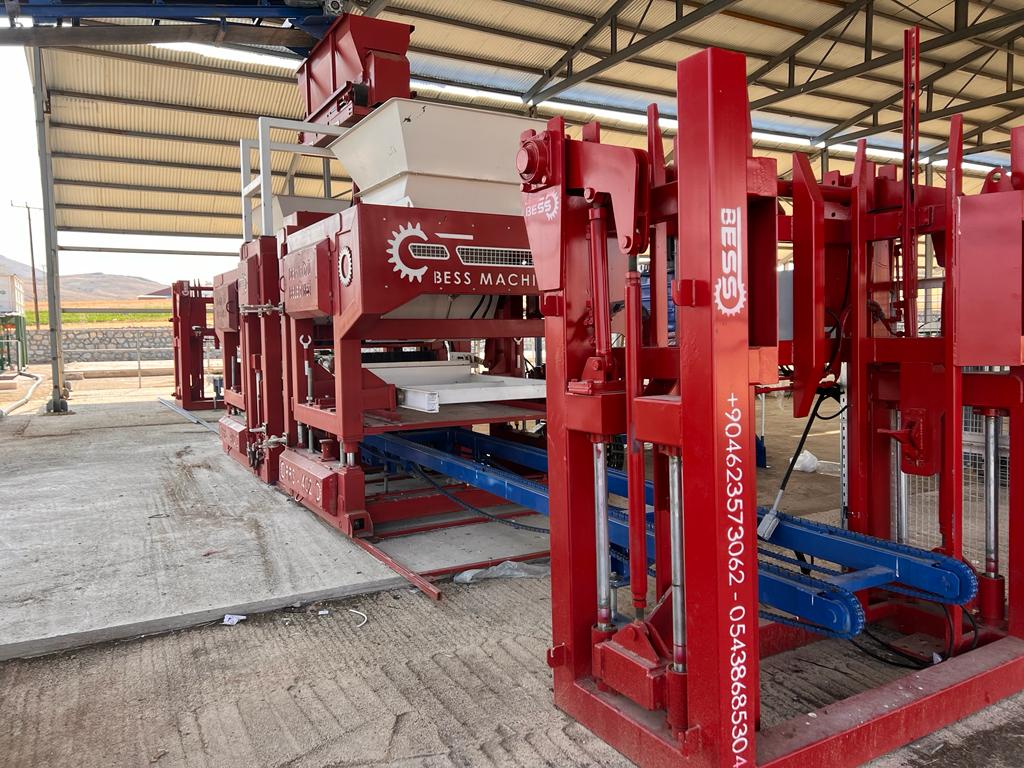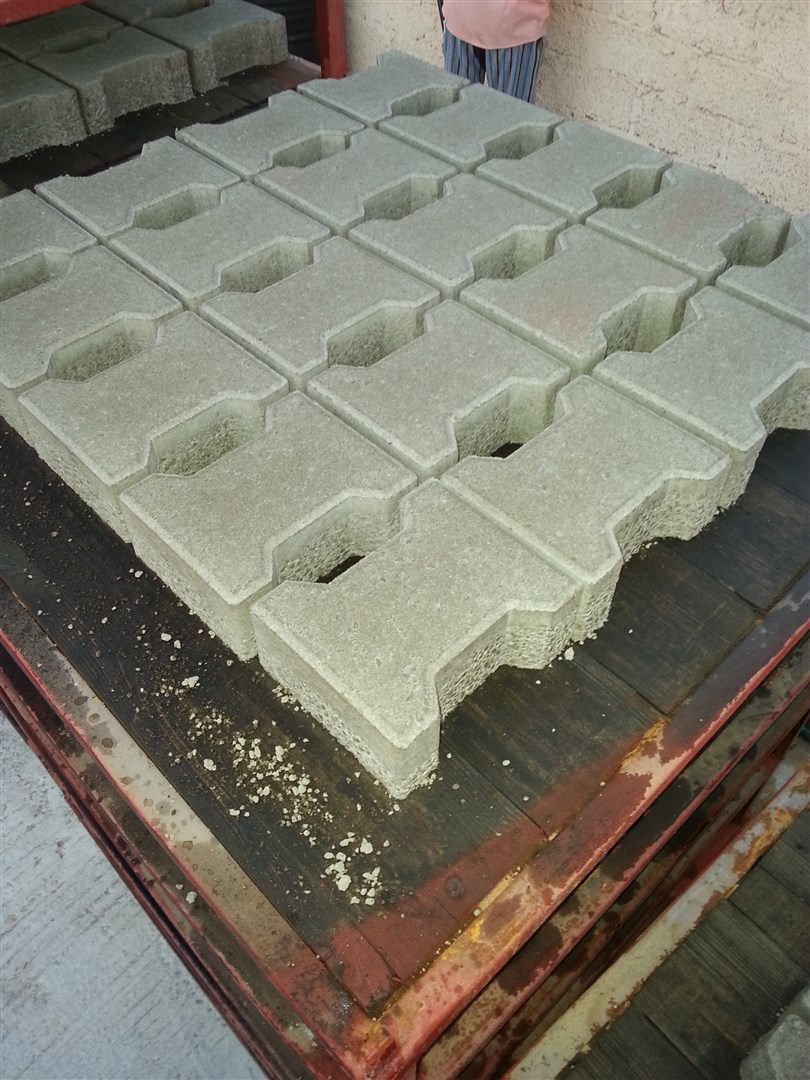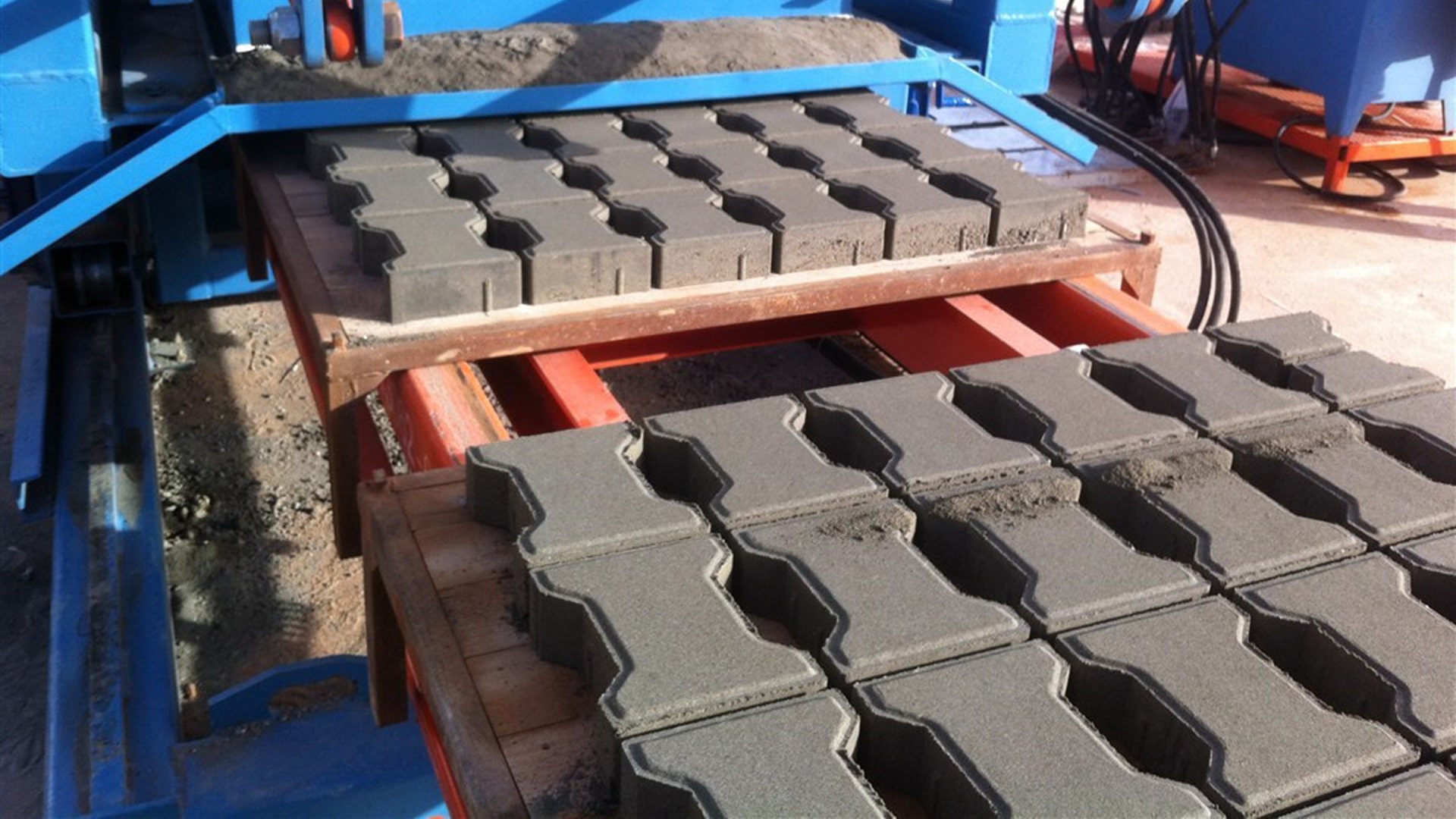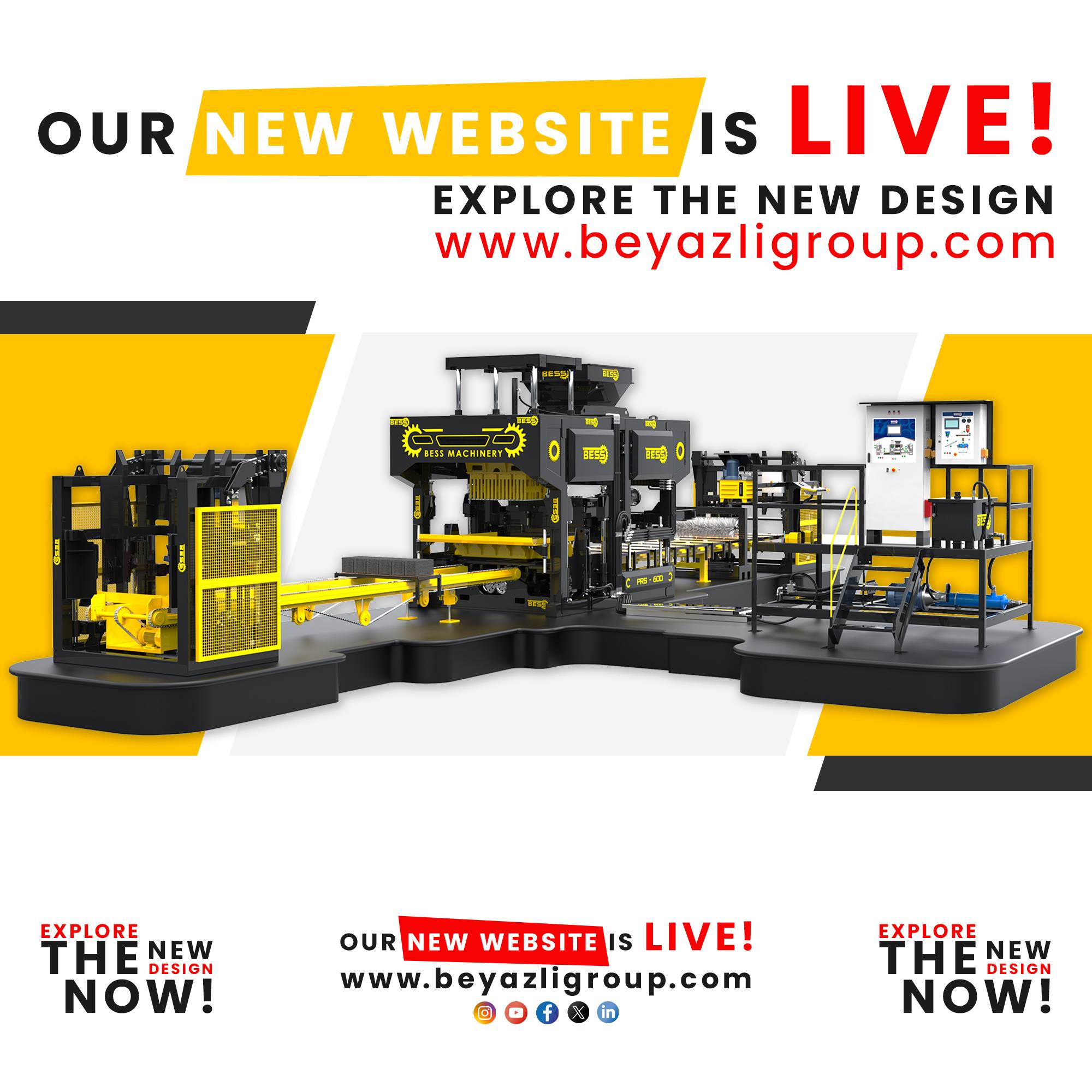First, we need to have detailed information about paving blocks. Then we can talk about paver block machines.
You may ask What a paver block or interlocking block is. Paver blocks are manufactured to be laid on the floor, and they are made of different materials with different shapes.

Paving blocks are made of different materials in different countries, but generally, they are made of the materials below:
- Powdered cement
- Water
- Crushed stone
- Sand
- Additives

Paving Block Advantages
The benefit of a paving block over other materials is that each paving block can later be lifted and replaced. Also, they are cheaper compared to other materials.
Paver blocks are produced in paver block machines. These machines use vibration and pressure in the molds to form the paver blocks. So they also bear more pressure compared to other materials.

Note that block making machines and paver block machines are different from each other. A paving block machine is a double-hopper machine that can produce double-layer blocks. However, a hollow block machine is a single-layer machine that can only produce single-layer blocks. If you are interested in this subject, you can read our article hollow block machine or concrete block machine.
Both machines can almost produce 600 different shapes, including hollow concrete blocks, paver blocks, solid blocks, curbstones, roof gutters, lego blocks. So don't get confused when you hear different names:
- Hollow block machine
- Block making machine
- Paving block machine
- Concrete block machine
- Interlocking brick machine

Paver Block Machine Mold
A concrete mold is a hollow metal container that is made of high-quality steel. For the paver block machine, each mold has two pieces
- Upper mold
- Down mold
They are also called male and female molds. The down mold has hollow spaces, and the upper half fills the gaps of the down mold. When the upper mold comes down, it fills the hollow spaces on the down mold. Hydraulic power is used to make movements in the machine.

High-quality molds for paver block machines have a guarantee of about 60.000 to 80.000 presses. When you pour mortar in the down mold of the paving block machine and press the other upper half to it with pressure and vibration, the concrete takes the shape of the mold.
Mostly ST-52 or Hardoax metal sheets are used to produce concrete molds.
Some of the available molds are:
- Hollow concrete block molds in different sizes and shapes
- Different Paving blocks with different dimensions, thicknesses, and shapes
- Different types of curbstone molds
- Styrofoam concrete molds
- Tile molds
- Roof blocks
- Grasscretes
To purchase a mold for your machine, you need to ask a mold manufacturer to produce it for you. We also produce all types of molds. All you need to do is to contact us. It normally takes 2 to 3 weeks to produce a high-quality mold. It is because of the cutting, shaping, and two times of hardening done by our factory.

Interlocking Paving Blocks
Interlocking means they lock each other when they are laid on the ground. The idea of interlocking paving blocks originated in the Netherlands. They replaced the brick on the surface of the streets with paving blocks for the first time. At that time, there was no paver block machine, and they have produced them manually and by hand.

These paving blocks are more durable than asphalt, easy to repair and maintain. Paving blocks are even resistant to earthquakes. If you are interested to learn more about this subject, you can read our article interlocking brick machine.
Paver Block Machine
Generally, we have two types of paver block machines, as explained below.
- Single-hopper machine:
The single-hopper machine can only produce single-layered paving blocks. It means if you want to have a smoother surface, you need to apply it to the whole mortar of the paving block. If you also need colored paving blocks, you need to color the paving block's whole mortar.
Applying color pigments to the whole mortar will charge you extra costs to the paving blocks' final price compared to the double-hopper paving block machine. Single-layer machines are also called brick making machines.

- Double-hopper machine:
The double-hopper machine has two mortar hoppers, enabling you to produce double-layered blocks. The first layer is the coarse main mortar and the second layer is the surface of the paving block. You only need to apply your desired quality to the top layer. The upper layer can have different thicknesses and colors depending on customer demands. These machines are also called paving block machines.

Note that with both machines, you can produce the paving blocks that you need. You can produce any shape with a height between 5cm to 30cm. Suppose you want to produce any unique shapes that are not in our standard gallery. In that case, you can contact us to manufacture the mold for you.
Bess has its mold manufacturing workshop, and it can produce any mold you need. The English department's contact details are available at the end of this article.
Paver Block Machine Capacity
As mentioned above, the paver block machine is a machine that can produce different concrete products like hollow concrete blocks, paving blocks, curbstones, styrofoam concrete blocks, tiles, and roof gutters. You only need to change the molds to produce different products.

To calculate the block-making machine's capacity, there is a standard way. The paver block machine's capacity is determined by how many square meters it can produce in 8 hours. The smallest machine produces 300 m2 in an eight-hour shift. Suppose you need to determine the paving block machine's capacity in the total number of paving blocks that it produces. In that case, you need to know that in each square meter of the paving block, there usually are 36 paving stones.
In the table below, you can see the production capacity of different machines:
| Machine Name | Production Capacity in an Eight-Hour Shift | Paver Blocks Produced in Each Press | Automation Level of The machine |
|---|---|---|---|
| PRS-402 | 300 m2 | 12 pieces | Semi-Automatic and automatic |
| PRS-602 | 400 m2 | 16 pieces | Semi-Automatic and automatic |
| PRS-802 | 550 m2 | 20 pieces | Semi-Automatic and automatic |
| PRS-1002 | 700 m2 | 25 pieces | Semi-Automatic and automatic |
Paver Block Machine Production Process
First, you need to provide your paver block machine with aggregates like cement, water, sand, and additives to produce paving blocks. They are stored in special compartments with an unloader cover under them. By this container and the weighing conveyor belt, they are weighed and then delivered to the machine's mixer.
Cement is also stored in cement silos, and water is added through a pump and a digital counter. The water is measured by liter when added to the mixer. In the mixer, all the materials are mixed, and after the water is added to them, they form the mortar needed for the machine. This mortar has a standard ratio for each of the ingredients.

It is essential to add the materials by the standard ratio because it affects your product's strength and saves you money by using the right amount of cement. Cement is the most expensive ingredient in the mixture needed for the interlocking brick machine.
The mortar is then carried to the hopper of the paver block machine. Suppose you have a double-hopper paving block machine. In that case, the process repeats itself, and this time, additives like color are added to form the upper layer.
An unloader cover on both hoppers leads the mortar to the mold cart. This part of the machine moves above the mold to fill the mold with the mortar. After it fills the mold with the mortar, vibration occurs to fill the small gaps in the mortar. By vibration, the mortar shrinks, and it should be filled again. For this reason, the mold-filling machine moves back and forth again to fill the mold for the last time.
Some paver block machines do the filling process and vibration simultaneously to save time in the process.

When the mold is filled with mortar for the second time, the hydraulic press pushes the upper mold to the down mold with 120 bars of pressure.
The press is done over the surface of the pallets. After the mortar is formed, both molds move up so the pallet can be delivered out of the machine.
Talking about the pallets, they are optionally made of wood, metal, or plastic. They have different sizes related to the capacity of the machine. The smallest pallet is 50cm in width 100cm in length and 4cm Thick. The pallets with the products on them are then delivered to the curing section. This can be done both manually and automatically.

Pallet System of The Machine
The pallet input system differs in manual and automatic paver block machines. The products should be collected from the pallets' surface by hand in the manual system. The pallet should then be placed in the machine's pallet feeding robot.
After the products are dried in the automatic system, you first need to put them in the pallet feeding system in the paver block machine, and then they are divided. They come out on the rails of the machine one by one. This is where the products are collected by hand or optionally by a robot. The pallet is then guided to the press of the machine and the cycle repeats itself.

In the manual system, the pallets are taken to the curing section with special handcarts one by one. In contrast, in the automatic system, five are collected on top of each other by the paving block machine. They are carried to the curing section by a forklift.
It is recommended to buy automatic paver block machines for the countries where the land and labor costs are expensive because the automatic system requires fewer workers and less curing area. For the countries where land and labor cost are cheap, the manual system serves better. Here is a video of one of our paving block machines. For more videos, you can also visit the Bess youtube channel.
Paver Block Machine Price
The paver block machines' prices are different from one another. It depends on the manufacturer company's location, the machine's capacity, the automation level, and most important the quality of the machine.
Suppose you want to choose the best paver block machine based on your budget. In that case, you can contact Bess professional consultantsto have a better background about the machines. It would be best if you also had in mind not to spend all your budget on the paving block machine but to save some of it to buy aggregates and prepare your site for this purpose.
You also need training for your operators to work with the machine. Otherwise, the machine will fall into failure in no time due to the machine's improper use.
To order the right machine for your plant, you need to consider these facts:
- The capacity of the machine
- The automation level of the machine
- Determining if cement silos are needed or not
- Preparing the land needed for the paver block plant. This depends on your machine capacity
Bess company supports these items for the machine:
Installation, commissioning, staff training, and two years of guarantee for the machine itself.
Conclusion
Suppose you are starting your paver block production line and don't have experience related to paver block machines. In that case, Bess provides you with your concrete block manufacturing business plan based on your country and the automation level of your machine. You can also contact our English department. Bess engineers are here to help you find the best solution for your plant.
















